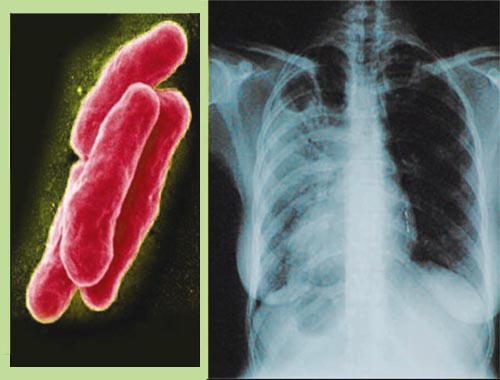Tuberculosis (Consumption, phthisis)

Published: 18 Jun 2025
ICD9: 010.00 ICD10: A15.7 ICD11: 1B10
Tuberculosis (TB), historically known as consumption or phthisis, is an infectious disease caused by bacteria called Mycobacterium tuberculosis (M.
tuberculosis). It primarily affects the lungs (pulmonary TB) but can also affect other parts of the body (extrapulmonary TB) such as the brain, kidneys, or bones.
Here's a breakdown of why it was called consumption and phthisis:
![]() Consumption: This term came about because TB often caused a gradual wasting away of the body. Sufferers would lose weight, have a persistent cough, night sweats, and fatigue, essentially being "consumed" by the disease.
Consumption: This term came about because TB often caused a gradual wasting away of the body. Sufferers would lose weight, have a persistent cough, night sweats, and fatigue, essentially being "consumed" by the disease.
![]() Phthisis: This word is of Greek origin, meaning "to waste away" or "decay," again reflecting the wasting nature of the illness.
Phthisis: This word is of Greek origin, meaning "to waste away" or "decay," again reflecting the wasting nature of the illness.
Key Characteristics of Tuberculosis:
![]() Cause: Bacteria called Mycobacterium tuberculosis.
Cause: Bacteria called Mycobacterium tuberculosis.
![]() Transmission: Spread through the air when a person with active TB disease coughs, speaks, sings, or sneezes.
Transmission: Spread through the air when a person with active TB disease coughs, speaks, sings, or sneezes.
![]() Symptoms:
Symptoms:![]()

![]() A bad cough that lasts 3 weeks or longer
A bad cough that lasts 3 weeks or longer![]()

![]() Pain in the chest
Pain in the chest![]()

![]() Coughing up blood or sputum (phlegm from deep inside the lungs)
Coughing up blood or sputum (phlegm from deep inside the lungs)![]()

![]() Weakness or fatigue
Weakness or fatigue![]()

![]() Weight loss
Weight loss![]()

![]() No appetite
No appetite![]()

![]() Chills
Chills![]()

![]() Fever
Fever![]()

![]() Sweating at night
Sweating at night
![]() Latent TB infection: A person can be infected with TB bacteria but not have active TB disease. In this case, they have no symptoms, are not contagious, but the bacteria are alive and inactive in their body. Latent TB can become active TB disease later.
Latent TB infection: A person can be infected with TB bacteria but not have active TB disease. In this case, they have no symptoms, are not contagious, but the bacteria are alive and inactive in their body. Latent TB can become active TB disease later.
![]() Diagnosis: Skin tests, blood tests, chest X-rays, and sputum tests.
Diagnosis: Skin tests, blood tests, chest X-rays, and sputum tests.
![]() Treatment: TB is treated with antibiotics. Treatment typically lasts for 6-9 months, and it's crucial to complete the entire course of medication to prevent drug resistance.
Treatment: TB is treated with antibiotics. Treatment typically lasts for 6-9 months, and it's crucial to complete the entire course of medication to prevent drug resistance.
![]() Prevention:
Prevention:![]()

![]() BCG vaccine (used in some countries, not routinely recommended in the U.S.)
BCG vaccine (used in some countries, not routinely recommended in the U.S.)![]()

![]() Treatment of latent TB infection to prevent active TB disease.
Treatment of latent TB infection to prevent active TB disease.![]()

![]() Infection control measures to prevent the spread of TB bacteria.
Infection control measures to prevent the spread of TB bacteria.
Why are the old names important?
Knowing the historical names helps in:
![]() Understanding historical literature and medical records: Many older texts will refer to TB as consumption or phthisis.
Understanding historical literature and medical records: Many older texts will refer to TB as consumption or phthisis.
![]() Appreciating the historical impact of TB: The disease was a major cause of death and suffering for centuries, and understanding its older names provides context to its historical significance.
Appreciating the historical impact of TB: The disease was a major cause of death and suffering for centuries, and understanding its older names provides context to its historical significance.
Tuberculosis remains a significant global health problem, especially in developing countries. Public health efforts are focused on early diagnosis, treatment, and prevention to control the spread of the disease.